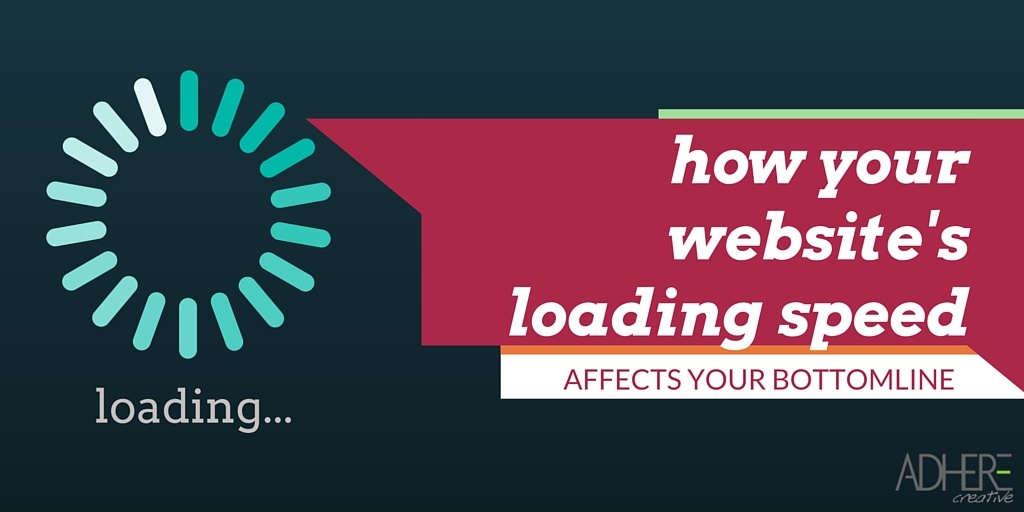 Adam Marquardt
Adam Marquardt
Your graphics are pretty. Your message is on point. You offer some of the best products or services within your industry. You did the background research on your target audience. So, what is going wrong? Why is the inbound marketing team showing you analytics indicating high bounce rates? Can your page loading time be to blame?

Average e-commerce websites can take 7 seconds to load, far higher than the ideal load time of 3 seconds or less. Approximately 94% of smartphone users search for local information using their phones. Getting your websites, images and videos to load quickly are an absolutely necessity for inbound marketing success. Audiences frustrate easily and want a seamless process while researching online. Users will often turn to a competitor’s site if they are having a poor user experience and waiting for pages to load.
Did you know that 14% of your audience will start shopping at another site if your page loads are slow and 23% will simply stop the shopping experience or walk away from the computer? Page load speed helps keep users tuned in. You need to know if page loading time is the culprit in your equation and make the necessary adjustments. Understand the relationship between page load speed, conversion and revenue today.
Your Rankings Increase through Search Engine Optimization Tactics
Your website must be mobile-friendly and follow current guidelines for search engine optimization. Websites that comply to search engine requests see a boost in their rankings. Page loading speed is one of the factors at play in the Google algorithm. In fact Google has an open source coding system to help website owners and develops to reduce page loading times and get images, videos and more to your audience faster than before across all mobile devices. PageSpeed Insights is available via Google and offers businesses and developers to test their pages for loading time, review general rules, and get ratings and feedback on the User Experience. For any suggestions in terms of Speed or User Experience, the ways to fix an issue are also included.
Matt Cutts, former head of the web spam team at Google, wrote about site speed as one of the signals used in search ranking determination. He mentions that even small changes can make a big difference on page loading speed. He wrote:
“Also take a step back for a minute and consider the intent of this change: a faster web is great for everyone, but especially for users. Lots of websites have demonstrated that speeding up the user experience results in more usage. So speeding up your website isn’t just something that can affect your search rankings—it’s a fantastic idea for your users.”
Your steps in improving page load speed as part of your SEO optimization efforts makes it easier for potential customers to find you and navigate your website. Many sites do not require a revamp but select adjustments to see a positive change. You owe it to yourself and your business to ensure that your website is performing at its best and getting you the eyeballs and traffic you need to maintain profitability.
Improve User Experience
It’s not just hearsay. Studies have been done to support the fact that users are more satisfied with faster page load speed. User dissatisfaction rates increased 1 to 4% when delays of 500 milliseconds and 2 seconds were introduced to loading times. In addition, query volume decreased with artificial delays that left a lasting impact on websites even after the test was stopped. This reduces the impact of future inbound marketing initiatives.
As mentioned earlier a significant portion of users faced with slow loading times will walk away or turn to another site. In addition, 64% of users that are once dissatisfied with a visit to your site will simply go to another site next time they need to shop. Your future revenue and growth is going to be impacted the longer you delay.
The whole point here is to avoid that and make your website load speed as fast as possible. It’s not just for search engine optimization purposes, even though that is a positive, but to keep prospects and customers happy.
See More Revenue
Research backs up that site speed improvements can improve conversion rates. Shopzilla and Firefox ran tests of page loading time on conversion. Shopzilla saw that faster pages had 7 to 12% more conversions than slower pages. Firefox’s test saw a higher increase with 15.4% in conversions. Whether desired conversions are to download a video, enter details to receive your next newsletter, or to purchase, page loading time matters. What would a potential 7 to 15% increase in conversion mean to your business? Can you afford not to make a few simple adjustments to your page load speed?
“I would love if SEOs dive into improving website speed, because (unlike a few facets of SEO) decreasing the latency of a website is something that is easily measurable and controllable. A #1 ranking may not always be achievable, but most websites can be made noticeably faster, which can improve ROI and conversion rates.” - Matt Cutts, Google
Improving page loading speed is a constructive way to enhance the user experience for businesses both big and small. It is easy to check pages and make small tweaks to coding, layout or embedded features to see a marked improvement in loading time.
Page load speed is not a mythical beast that cannot be slayed. It is a real factor that can be easily tackled. Headway can be made that will make for more satisfied customers and significantly increase conversions. So what are you waiting for?


